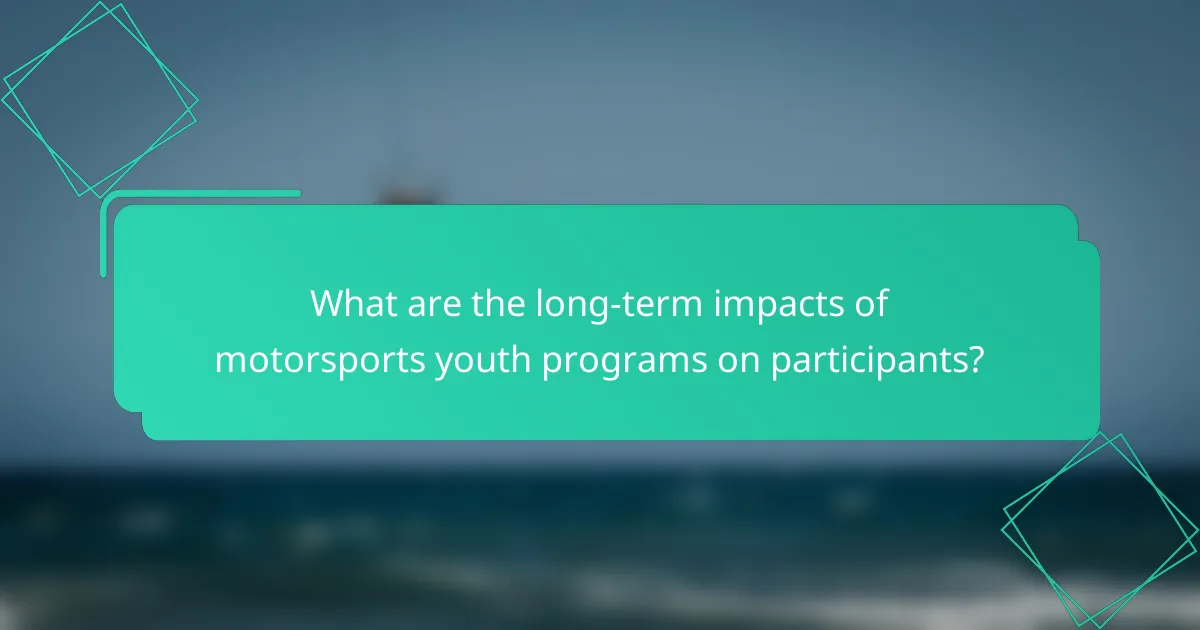Motorsports youth programs enhance essential skills such as teamwork, communication, and technical knowledge. They address challenges like resource access and safety concerns while promoting discipline and personal development. Key organizations like the SCCA and NASA provide hands-on experiences in karting, motocross, and rally racing. These programs also integrate modern technology to prepare participants for future careers in the motorsports industry.

What skills do motorsports youth programs aim to develop?
Motorsports youth programs aim to develop essential skills such as teamwork, communication, and technical knowledge. These programs focus on fostering leadership abilities and promoting safety awareness. Participants also gain problem-solving skills through hands-on experiences in vehicle maintenance and racing strategies. Additionally, they learn about sportsmanship and the importance of discipline in competitive environments.
How do these programs enhance driving techniques?
Motorsports youth programs enhance driving techniques by providing structured training and real-world experience. These programs focus on developing essential skills such as precision, control, and situational awareness. Participants engage in hands-on activities that simulate competitive environments, fostering quick decision-making and adaptability. Additionally, mentorship from experienced drivers offers valuable insights, further refining techniques. Overall, these programs cultivate a strong foundation for future motorsport endeavors.
What role does teamwork play in skill development?
Teamwork is essential in motorsports youth programs for skill development. It fosters collaboration, enhances communication, and builds trust among participants. By working together, young drivers learn to strategize, share knowledge, and support each other, which accelerates their individual growth. Programs that emphasize teamwork often yield better performance outcomes and instill valuable life skills. Engaging in team-based activities also cultivates a sense of belonging, motivating youth to pursue their passion for motorsports.
How are safety protocols integrated into training?
Safety protocols are integrated into motorsports youth programs through structured training modules. These modules emphasize risk management, vehicle handling, and emergency response.
Participants engage in hands-on drills that simulate real-world scenarios, ensuring they can apply safety measures effectively. Regular assessments reinforce knowledge retention and practical application of safety protocols.
Instructors are trained to prioritize safety, instilling a culture of awareness and responsibility among young drivers. This comprehensive approach fosters both skill development and a commitment to safety in motorsports.

Which organizations offer motorsports youth programs?
Organizations that offer motorsports youth programs include the Sports Car Club of America (SCCA), the National Auto Sport Association (NASA), and the Junior Karting Association. These programs focus on skill development, safety, and fostering a love for motorsports among young enthusiasts. Additional organizations like the International Karting Federation (IKF) and local racing clubs also provide opportunities for youth participation in motorsport activities.
What are the key features of the Canadian Karting Association programs?
The Canadian Karting Association programs focus on youth skill development through structured training and competitive opportunities. Key features include comprehensive training modules, safety protocols, mentorship from experienced drivers, and access to various racing events. These programs aim to enhance driving skills, promote teamwork, and foster a passion for motorsports among young participants. Additionally, the association emphasizes the importance of sportsmanship and personal growth in a competitive environment.
How do UK-based motorsports programs differ from those in the US?
UK-based motorsports programs emphasize grassroots participation and community engagement, while US programs often focus on commercial aspects and professional pathways.
In the UK, youth programs typically integrate karting as an entry point, promoting skill development through local clubs and competitions. The emphasis is on fostering talent from a young age, with initiatives supported by motorsport governing bodies.
Conversely, US programs often prioritize sponsorship opportunities and professional racing careers. This leads to a more structured approach, with significant investment in training facilities and resources aimed at producing elite drivers.
Both regions aim to develop skills, but the UK favors community involvement, while the US leans towards commercial success and professional advancement.

What are the benefits of participating in motorsports youth programs?
Participating in motorsports youth programs enhances skills, discipline, and teamwork. These programs provide hands-on experience, fostering technical knowledge and safety awareness. Participants develop critical thinking and problem-solving abilities, essential for both racing and life. Additionally, they build lasting friendships and connections within the motorsports community, promoting social skills and networking opportunities.
How do these programs foster personal growth and confidence?
Motorsports youth programs foster personal growth and confidence through skill development and teamwork. Participants learn discipline and resilience while mastering driving techniques. Programs often include mentorship, which boosts self-esteem and encourages goal-setting. Engaging in competitive environments enhances decision-making skills and fosters a sense of accomplishment.
What networking opportunities arise from involvement in youth motorsports?
Involvement in youth motorsports offers numerous networking opportunities that can enhance personal and professional growth. Participants can connect with industry professionals, sponsors, and fellow enthusiasts, fostering valuable relationships.
These programs often host events where young drivers meet team owners, engineers, and marketing experts. Such interactions can lead to internships, mentorships, and potential career paths in motorsports. Networking within these communities also allows for the exchange of knowledge and experiences, enriching skill development.
Additionally, youth motorsports programs frequently collaborate with educational institutions and organizations, creating platforms for workshops and seminars. This exposure broadens participants’ understanding of the industry and opens doors to future opportunities.
Overall, the networking potential in youth motorsports is significant, offering a unique blend of skill development and professional connections.

What challenges do youth face in motorsports training?
Youth in motorsports training face challenges such as limited access to resources, high costs, and safety concerns. These obstacles can hinder skill development and participation in programs.
Access to quality training facilities is often restricted, especially in rural areas. Many young athletes lack mentorship and guidance, which are crucial for advancing their skills. Additionally, the financial burden of equipment, travel, and entry fees can deter participation.
Safety is a significant concern, as motorsports inherently involve risks. Young drivers may not have adequate training or experience to handle high-speed situations, leading to potential accidents.
Finally, balancing academics and training can be difficult. Young athletes often struggle to find time for schoolwork while pursuing their passion in motorsports, impacting their overall development.
How can financial barriers impact participation?
Financial barriers significantly limit participation in motorsports youth programs. These obstacles often include costs related to equipment, entry fees, and travel expenses. For many families, these financial demands can outweigh the perceived benefits of skill development in motorsports. As a result, youth with potential may miss opportunities to engage in valuable experiences that foster teamwork, discipline, and technical skills. Programs that offer financial assistance or sponsorships can help alleviate these barriers and promote inclusivity.
What common misconceptions exist about youth in motorsports?
Common misconceptions about youth in motorsports include the belief that it is solely for the wealthy and that it promotes reckless behavior. Many assume that motorsports lack educational value. In reality, youth programs focus on skill development, teamwork, and discipline. These programs often provide scholarships and support for diverse participants, breaking financial barriers. Additionally, motorsports instill safety awareness, emphasizing responsible driving.

Which types of motorsports are most popular among youth programs?
Motorsports youth programs often focus on karting, motocross, and rally racing. These activities are popular due to their accessibility and skill development opportunities. Karting introduces fundamental driving skills in a controlled environment, while motocross enhances physical fitness and coordination. Rally racing promotes teamwork and strategic thinking, appealing to youth seeking adventure. Each motorsport offers unique benefits that foster confidence and discipline among participants.
How does karting serve as an entry point for young drivers?
Karting serves as an effective entry point for young drivers by providing foundational skills and experience. It enhances hand-eye coordination, reflexes, and decision-making under pressure. Karting also fosters a sense of competition and teamwork, essential for motorsports. Programs often emphasize safety and vehicle control, ensuring young drivers are well-prepared for advanced racing. Many professional drivers credit karting as the starting point of their careers, highlighting its importance in skill development.
What are the unique aspects of off-road racing for youth?
Off-road racing for youth offers unique aspects that enhance skill development. It fosters teamwork, builds resilience, and improves decision-making under pressure. Youth participants gain hands-on experience with vehicle mechanics, enhancing their technical knowledge. Additionally, off-road racing promotes physical fitness and coordination, essential for navigating challenging terrains. The thrill of competition instills a sense of achievement and boosts confidence, crucial for personal growth.

How do motorsports youth programs adapt to technological advancements?
Motorsports youth programs adapt to technological advancements by integrating modern tools and techniques into their training. These programs utilize simulators, data analytics, and virtual reality to enhance skill development. For example, simulators provide realistic driving experiences, allowing young drivers to practice safely. Data analytics helps coaches assess performance metrics, leading to personalized training plans. Additionally, programs often collaborate with tech companies to stay updated on innovations, ensuring participants gain relevant skills for future careers in motorsports. This proactive approach fosters a competitive edge and prepares youth for evolving industry demands.
What role does simulation training play in skill development?
Simulation training is crucial in motorsports youth programs as it enhances skill development through realistic practice scenarios. It allows young drivers to experience various racing conditions without real-world risks. Participants can refine their techniques, improve reaction times, and learn to make quick decisions. Furthermore, simulation training provides immediate feedback, enabling targeted improvements in performance. This approach fosters a deeper understanding of vehicle dynamics and track strategies, ultimately preparing youth for competitive environments.
How are electric vehicles influencing youth motorsports programs?
Electric vehicles are transforming youth motorsports programs by promoting sustainability and innovation. These programs now emphasize electric vehicle technology, which enhances technical skills and environmental awareness among young participants.
Incorporating electric vehicles introduces youth to advanced technologies such as battery management and electric drivetrains. This exposure prepares them for future automotive careers, aligning with industry trends toward electrification.
Moreover, electric motorsports often require less maintenance and lower operational costs, making them more accessible for youth programs. This accessibility can increase participation rates and foster a diverse range of talent in motorsports.
As a result, youth motorsports programs are evolving to prioritize skills relevant to the future of transportation, ensuring participants are well-equipped for the changing landscape of the automotive industry.

What are the long-term impacts of motorsports youth programs on participants?
Motorsports youth programs positively impact participants by enhancing skills, discipline, and teamwork. These programs foster personal development, including improved confidence and decision-making abilities. Participants often develop technical skills related to vehicle mechanics and safety, contributing to lifelong interests in automotive fields. Additionally, involvement in such programs can lead to networking opportunities and potential career paths in motorsports or related industries.
How do these programs influence career paths in motorsports?
Motorsports youth programs significantly influence career paths by providing essential skills and networking opportunities. These programs enhance technical knowledge, driving skills, and teamwork, crucial for advancement in motorsports careers. Participants gain access to industry professionals, mentorship, and potential sponsorships, shaping their future prospects. Additionally, early exposure to competitive environments fosters resilience and adaptability, traits valued in motorsports careers.
What success stories highlight the effectiveness of these programs?
Motorsports youth programs have demonstrated significant effectiveness through various success stories. One notable example is the Formula E Accelerate program, which has helped over 100 young drivers gain essential skills and experience in electric motorsport. Another success is the NASCAR Drive for Diversity program, which has successfully increased minority representation in motorsports, leading to several drivers advancing to professional racing. Additionally, the Red Bull Racing Junior Team has nurtured talents like Max Verstappen, who became a Formula 1 champion at a young age. These programs not only enhance driving skills but also promote teamwork, discipline, and leadership among youth participants.
What best practices can enhance participation and engagement in youth motorsports?
Engaging youth in motorsports requires implementing best practices that foster participation. Prioritize hands-on experiences, such as workshops and track days, to develop skills and build confidence. Encourage mentorship programs where experienced drivers guide newcomers, enhancing their learning. Leverage social media to create community and share success stories, which motivates involvement. Lastly, organize regular competitions to provide a platform for youth to showcase their skills and gain recognition.


